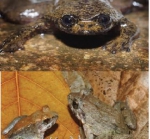Prof. Djoko T. Iskandar: A Witness to the Diversity of Indonesia

BANDUNG, itb.ac.id – Prof. Djoko Tjahjono Iskandar is a professor of ITB and a world-acclaimed herpetologist. Herpetology, his study field, is a branch of biology that studies reptiles and amphibians. One of his notable discoveries in Borneo’s rainforest is lungless frog. Born in Bandung on 23 August 1950, this lecturer is enlisted as the most productive ITB professor in terms of academic publication.
 Initial Interest toward Frog
Initial Interest toward Frog
Prof. Djoko studied on the bachelor program of ITB in 1975. He then continued his study to post-graduate program (magister and doctoral) in Université des Sciences et Techniques du Languedoc, Montpellier, France. After finishing his doctoral study, he returned to Indonesia and started working as a herpetologist. He revealed that, after Indonesia’s Independence until 1970s, there were only five Indonesian academic journals that discuss about the existence of frogs. He felt discontent because Indonesia has the biggest biodiversity in the world.
His interest in frogs began with animals found around home. He then began to pay attention to frogs and interested to further his research. Committed to his job as a researcher, he conducted many expeditions to wander around woods, discovering the existence of frog species. Countless expeditions have he done for the last 40 years, cooperating with Indonesian and foreign researchers.
Being humble, he said that God blesses his field of research that he was able to find endangered species that ‘shake’ the world. He has six species of frogs that attached with his name as achievement for his contribution to herpetology in discovering 33 species of frog. His publications have made him world-renowned and bring many foreign parties to cooperate with him.
From Field Experience to Near 2800 Citations
Prof. Djoko is a highly productive academic in publications. Webometrics stated that Prof. Djoko sit on the 19th position of all Indonesian researchers in journal publication with 26 publication and 2800 citations (http://www.webometrics.info/en/node/96). His academic publication topic discuss around evolution, systematic, ecology, biogeography, and herpetofauna conservation. Aside from academic journals, he has also published a book entitled “Amfibi Jawa dan Bali”.
During his expeditions, Prof. Djoko learnt many things from the nature and its residents. He admitted that he did not only observe faunal diversity but also cultural diversity of Indonesia. Every time he goes to remote areas, he gains new perspective on the problems of society. Observing frogs help him to gain many lesson learnt, “I saw ongoing biological processes. Not the organism but the process and concept. My thought could go back to the prehistoric era million years ago, or go further to the future, thinking of connecting biology with geology and other processes. That is what revolves around my head,” said Prof. Djoko.
Currently 67 years old, Prof. Djoko still concerns himself with teaching activity in School of Life Sciences and Technology (SITH) of ITB. He is still active in research and writing. Even though he lessens his field activity, his passion in research does not wane “The result of my 40 years long of expedition has piled up. Now I write, research, write,” he said.
Prof. Djoko added, “If you are a beginner, you must be looking for unique thing. However, after years of working, general thing will reveal interesting thing. After years of works, years of gathering information, everything will be interesting, and people usually are not aware of it.”
For Future Generations
Prof. Djoko hopes that future generations will be the successor to discover the identity of Indonesia, its biodiversity the country has. “First, and this I always assert, work with the diversity of Indonesia. We have abundant of natural wealth. Even a hundred people like me would never be able to complete the entire issue on frog. Therefore, I would be glad with many people (participate in research), hence the knowledge will advance rapidly. I began from the bottom. With my publications, I hope future generations do not need to begin from the bottom. With technology advancement now, I give them all the basic needed so they could surpass me.”
Reporter: Mega Liani Putri (Environmental Engineering 2013)
Images Source: sith.itb.ac.id

scan for download








